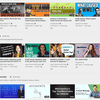
Yet another reminder about how we should plan for the ways our users customize our sites for their own needs. Will your site remain usable to folks browsing with an extension that helps them observe hijab?

Yet another reminder about how we should plan for the ways our users customize our sites for their own needs. Will your site remain usable to folks browsing with an extension that helps them observe hijab?

Excellent analysis by Tim here:
Good frameworks should provide a better starting point on the essentials (security, accessibility, performance) or have built-in constraints that make it harder to ship something that violates those.
That doesn’t appear to be happening with performance (nor with accessibility, apparently).
…
What is clear: right now, if you’re using a framework to build your site, you’re making a trade-off in terms of initial performance—even in the best of scenarios.
Some trade-off may be acceptable in the right situations, but it’s important that we make that exchange consciously.
Do yourself a favor and tuck into the numbers here. He presents a substantial amount of very useful information.

This is why I continue to be so excited about Progressive Web Apps:
[T]his will allow for full feature parity among devices and allow development teams to focus on one project as opposed to juggling multiple updates for all of the different platforms. In addition to this, the way updates happen are in real time as the web site is reloaded. No need to rely on users not updating their apps through the app store, this way all users are on the latest version to ensure the best possible experience.
I am also really encouraged by the way PWAs enable more folks to access “apps.” After all, the state of networks and devices is quite different beyond the bubble we live in. Look at India, China, huge swaths of Africa, Central and South America. Closer to home, I look at the rural United States and less affluent neighborhoods in large cities. The benefits of PWAs (and the web, more broadly) to these folks will be huge. For example, they won’t have to choose between keeping pics of their kids on their phone and being able to easily access their bank account.

This is a great resource for understanding how to use the power of CSS when working in multiple languages.
I love this portmanteau!
Lableism: The act of intentionally removing web form labels and replacing them with placeholder text. Usually done in an effort to make form fields more aesthetically pleasing, while leaving blind and low vision users out in the cold.

This brief post offers some great advice for building resilient designs for any time, but which are especially relevant right now. In particular:
This isn’t the time to get precious about your favourite design and development tools. Use progressive enhancement as your philosophy. Your service might have to be accessed on old devices, in hospitals with outdated tech, or unsupported operating systems. HTML+CSS is your best bet to ensure that the service can be accessed in unlikely scenarios you haven’t even considered. Do you want to take that risk at a time like this? Me neither. Save the React squabbles for another time. Make it accessible and robust from day 1. Use the tools and components already at your disposal, and rely on the work others have done, to make them usable by everyone, to get you further more quickly.

Loving this easy to follow guide to inclusive design in Adobe’s Spectrum design system docs!
This is an exhaustive look at CSS counters and is well worth your time.

Oftentimes, if you cannot do something on your own, the common response is “just ask for help.” However, this is not an appropriate response to a person with a cognitive disability, as they should be able to access the web with the same independence as a person without a disability.
Amen!
This is a must-read!

Ethan delivered a powerful talk at New Adventures. It covers a wide range of topics including design, power, inequality, and more. Moreover it offers some suggestions for what we can do to make the web (and the world) better.